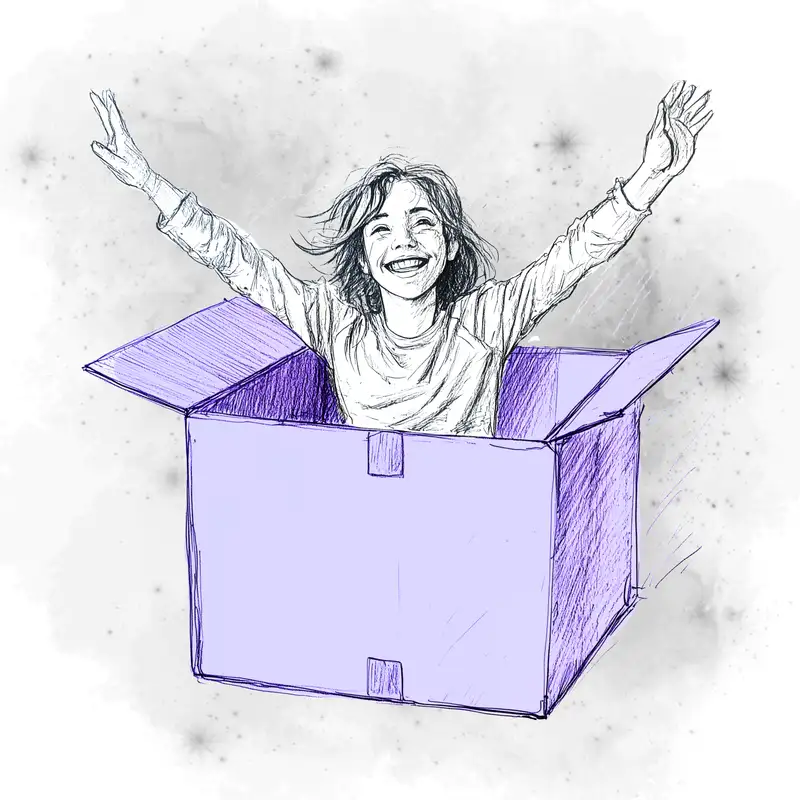
Is this who I am? Escaping the boxes we’re put in
MELODY: You know what is one of my biggest pet peeves?
FAITH: Cilantro?
MELODY: No. Well, yes, but no, no. For this one, what I'm talking about actually is the fact that, okay, there is this friend that I've got. The friend is not my pet peeve. But it is the fact that he's got this in his head, right, that I'm a night person and I'm a night owl. He's not wrong. But every time when it comes to planning something that is in the morning or doing something in the morning, oh my goodness, I get all these derisive comments, right? It's like, oh, I'm not going to be present. I will not be awake. And that even if I'm there, he's like, oh, your brain's probably not going to be working.
FAITH: Has that ever happened?
MELODY: My brain stop working? Well sometimes, but . . . [LAUGHS]
FAITH: Okay, yeah, I mean, I'm not going to say anything about that. But, you know.
MELODY: Well, no. This is what bugs me. What bugs me, right, is the fact that, yes, I agree. I'm a night owl. If given the choice, I would rather stay up late all night than wake up early. But does he know that I wake up at 6 o'clock every morning to exercise? Does he know that I start work at 7.30 every day? I have morning meetings. I'm present. I contribute. So am I a night owl? Yes, but still . . . and this is why it's like every time I have a conversation with him and somehow I don't know why, it comes out to this point about being in the morning or being at night. And then I get these really condescending derisive comments about the fact that I'm a night owl and it bugs me.
FAITH: He's basically stereotyped that night owls are active only at night. So it's very black and white for him, right? Clear cut. Night owls, because they're only active at night, therefore they cannot be intelligent in the morning. So therefore, you are non-functional in the morning.
MELODY: And it's like, well, it's . . . yes, so it's not the night owl bit. It's the fact that I've been stereotyped and I've been put in the box and it frustrates me. But while I'm currently functional, because we are, you know, it's not 7 o'clock in the morning, I'm going to introduce this podcast.
Live in the Grey is a Mums At The Table podcast where we try to understand what makes us tick and how it impacts our lives and relationships. Be that as a parent, partner or peer. Both Faith and I, Melody, have an interest in psychology. But I'm going to be clear, we're not experts.
And if it's not already ex . . . and if it's . . . [STUMBLES OVER WORDS]
FAITH: I'm just going to keep that in because I think it makes a really good blooper.
MELODY: Okay.
FAITH: Oh, you want to try that again?
MELODY: Where do I start from? And if it's not already obvious, today we're talking about stereotypes.
FAITH: And we could say that stereotypes is another form of labelling.
MELODY: Yep.
FAITH: So your example of night owl versus functional, non-functional, right? I'm sharing an example where someone completely bought into a stereotype and they assumed that people with depression are always confined to the bed, they are huddled under blankets, they are never leaving the house, they cry, they neglect basic hygiene, and I was told, "Faith, you can't possibly have mental health issues because you wore make-up today and you left the house today." And here's the twist. It came from a GP.
MELODY: No. Oh my goodness. It's . . . this . . . this is terrible. This is like . . . how . . . did you . . . did you time travel back to the 1600s and see a GP then?
FAITH: Okay. You know what? This kind of thing happens in life sometimes and I just want to clarify, I did get the help I needed in the end. I'm in a good place now. Okay, so... But this happens. This happens with labels. It happens with stereotypes. Right?
MELODY: I think that it's . . . it's funny and not funny, right? Because like, yes, at the same time, there is that stereotype and then . . . but then yet at the same time, you were trying to get a label as well. You're trying to get a stereotype, correct? Because . . .
FAITH: Yeah, because . . . because the label that I was trying to get was . . . I hoped that label would get me access to help. Get me access to resources that would give me the help that I thought I would need.
MELODY: So . . . so it's like, you know, I'm hating having a label and hating having a stereotype because it puts me in a box. Whereas you wanted a label to get the help you need. It's . . . you know, this whole labelling people kind of thing and diagnosing people, right? The reality is that, thankfully, from your instance, it is becoming more common nowadays. So we know a lot more. So it's a lot easier for us to label people. Easier for us to diagnose and put people with the labels that they are depressed, they are on the spectrum, on the ADHD. People are more open to doing that diagnosing because we know more. But . . .
FAITH: And then they can get the help that they need.
MELODY: Yes. But you know what? For me, this is my concern. I guess maybe because of what I experienced, right? What I'm worrying about this labelling is that it will end up putting people in a box and therefore not letting them reach their full potential. By way, let's just have an example. People who are labelled ADHD, kids who are labelled ADHD can be stereotyped and pigeonholed and people will go, "Oh, they're not going to perform well at school." Yes, they will get the help and support that they need because they have ADHD. But there is an underlying thing that goes like, "Oh, let's support them, but they're not going to perform that well."
FAITH: So there's an implication that we don't expect them to get a high-flying job when they graduate.
MELODY: Yeah. So it's like, you know, "Yeah, let's help them. But, you know, oh, well, don't expect it." And this is what really frustrates me about labelling people. Labelling, the labels, I feel like it diminishes people. You know, there are people out there like, okay, not you and I because, you know, we're angels. [LAUGHS] But there are people out there who, when they find out that someone is labelled something, right? Instead of helping, they just expect less of that person. You know, there's this phrase, right? "They would if they could." And it's meant to be a good phrase, but they weaponise it and they use it where they go, "Yes, they have this diagnosis. So we're going to give them the help that they need, but don't expect too much because they would if they could."
FAITH: Yeah. So we talked about they would if they could in our last conversation. And for me, that phrase is not so much a way to excuse responsibility or to diminish potential. But when I tell myself they would if they could, it's more like a way to help me stop blaming and access compassion, you know, and that's it.
MELODY: And that's really good. And I definitely agree with you because, yes, it does help me access that compassion as well. Let's talk about what we said in the previous episode, right? Where we're talking about how fat people are viewed as lazy and therefore they are lacking the will, but actually what they are lacking is the skill. So they would if they could, which then helps us to access that compassion and gives them that skill because we know that they're lacking in skill and that they behave the way that they're behaving or not achieving what they want to achieve because they don't have that skill. So we help them, we help to skill them up. But as I mentioned, there are people out there who will ignore all of that as well. And then they will simply dismiss someone or expect less of them. I mean, that's, I'm going to put you at the spot here now because before we started recording this, right? You were starting, you were going to remove some things and you're like, “Oh, I got to remove all of this because my spicy brain cannot handle it.”
FAITH: I labelled myself.
MELODY: Do you need to label yourself as spicy or do you, should you just remove the things? Because to me, because you know, I know who you are. I'm like, yes, I understand all of that. But then to someone else who doesn't know you, you've just given them the label that you are, you have a spicy brain.
FAITH: And you were being protective of me because when you asked me, do you need to label yourself? What I heard was, be careful because also when you label yourself, are you also putting yourself into a box, right? To a certain extent.
MELODY: Because you don't know what that person is thinking. Like the person, oh, the person suddenly go, went, “Oh, Faith has a label. Oh.”
FAITH: Right.
MELODY: Are they going to access the compassionate side of things or are they going to access, you know? The negative.
FAITH: Yes, because the tendency I've noticed is that when we approach labels, we tend to focus on the negative aspects of it, right? Like instead of hearing, I mean, going back to that whole night owl metaphor, it's not metaphor, it was a real story. The whole night owl story.
MELODY: Or bugbear.
FAITH: Well, we don't hear, oh, "Melody's a night owl, therefore, how brilliant will she be at night? How a live wire she will be," right? Because those are also aspects of that particular label. But instead we hear, "Oh, she won't function in the morning or she'll be late in the morning," right? So it's like between the two binaries, we tend to go down the negative path, right? Then the question is, if we give someone a label or give ourselves a label, will we be accessing compassion or will we be giving someone, or we'll be giving ourselves the keys to a negative path?
MELODY: And yeah, you're right. It does seem to go down the negative side of things because that's what bugs me, right? If he goes like, "Oh, you're a night owl, let's meet at night, or, oh, you're so great at night." It will bug me less.
FAITH: It will be a very different story, right?
MELODY: And the other problem with labels that I feel is that they can become self-fulfilling prophecies. So you call a kid stupid, right? Or you tell them, okay, maybe not stupid because that's too extreme. But say, for example, we say that they're not sporty or they're not a numbers person or whatever it is, it can lead to a child believing that they are indeed whatever you've labelled them as.
FAITH: Yeah, and we talk about labels or stereotypes, right? And they might hold a bit of truth, but it's only one part of the story. And when we latch on to that one aspect and we let it define the whole narrative, that narrow perspective prevents us from seeing the full spectrum, right, of someone's abilities. Like we're talking about life in the grey. So you've got black, you've got white. And if you hold on to only black and white, then you don't get to see the whole spectrum of everything. But I still think that labels help us to recognise shared experiences because for a lot of individuals, and this is my personal experience, that labels don't have to be a cage because labels can really be a key to accessing support and resources that might otherwise be missed.
MELODY: And so I think the grey here is this, it's more of having like a growth mindset as opposed to a fixed mindset. So instead of saying, you know, labelling saying that, "Oh, you're not good at maths or I'm not a numbers person," it's more of "I haven't learned it yet." And that's the grey. Because just because you're labelled something, like for me, just because I'm labelled a night owl doesn't mean that I can't perform in the morning. And so just because you're not good at maths and it's not your strong suit, it doesn't mean that you're doomed to never be able to do algebra or statistics.
FAITH: I mean, there's workarounds, right? We have calculators now.
MELODY: Call a friend.
FAITH: For me, it's not that labels in and of itself are good or bad. They can open doors. They can provide support. They can also box us in. There was a point in time where, yes, I was looking for a label and I was looking for a diagnosis. And then my therapist helped me to realise that I was already using healthy coping mechanisms to deal with the stresses in my life. And then getting labels was at that point, perhaps purely academic because it would not have changed the way I was managing my mental health. So it just, it was just another way to understand my journey, right? Yeah, without defining, without defining who I could be.
MELODY: I think that's the thing. Labels, yes, labels are helpful. Labels do provide you with understanding. But I guess it's also being careful as to who that label is revealed to or who uses that labels. And also being mindful about the fact and reminding yourself of the fact that, you know, labels don't have to define you.
FAITH: In the end, it is still just one piece. And that's something that I discovered is it's just one piece. The label was not going to be a magical solution for me, which is what I was hoping for. I think on hindsight, I realised that I was hoping the label would be a magic solution that once I know what, how to name it, I can then, it can be like a dragon I can slay. But it was just one piece of a puzzle and it would not have been a magical solution to know what to name it. I still had to do a lot of homework. And that is because I am more than a label. We are more than our labels. They don't define our worth. They don't define our values, our experiences and our choices and who we are. Yeah, it's so much more.
MELODY: So I may be a night owl, but I'll see you at six o'clock in the morning.
FAITH: Fully functional.
MELODY: Fully functional, yes. I should add, should add that. All right. With that, I'm going to wrap up this episode.
If you've enjoyed our chat today, please give us a thumbs up or five-star rating. Leave a comment and hit that subscribe button. Live in the Grey is a Mums At The Table podcast. So if you want to reach out to us, the best way is through the Mums At The Table social channels. We'd love to hear from you and we'll see you next month.
Episode Video
Creators and Guests

